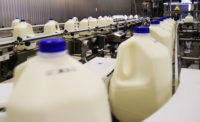By DSM Food Specialties
Global milk production is on the rise. According to the Food and Agriculture Organization of the United Nations, world milk production was forecast to grow by 1.6% to 816 million tons in 2016. Most was processed into cheese and fresh milk products. Within an increasingly competitive landscape, dairy processors must ensure their products are of the highest quality to stay ahead in the market. However, production and processing come with a number of challenges, such as bacteriophage (phage).
How does phage affect dairy production?
Phages are a problem for dairy processors because they can cause fermentation failure in the milk. This not only disrupts the production process, but also affects finished dairy products. If not fermented correctly, dairy products result in being low-quality, in terms of flavor, texture and food safety. They must be discarded or down-graded, which consequently leads to profit loss for the dairy processor. Furthermore, the product loss means that the industry is also faced with the broader global issue of general food waste.
The persistence of phage
A phage is a virus that infects and parasitizes bacteria. Also known as “bacterial viruses,” their classification is based on their host range (sensitive strains), morphology and molecular characterization (protein profile, genome size and deoxyribonucleic acid (DNA) homology). Phages are very difficult to avoid in dairy production and present a persistent ecological challenge.
There are different types of phages in every region worldwide and they can be found almost everywhere, transferring from one place to another very easily. Phages can be found in grass and on the udders of dairy cows. They end up being present in the raw milk and whey powders that enters a dairy factory. Once in a dairy processing plant, the different types of phages can be passed between people, and they even travel through the air. When a bacterial host is found, a propagation cycle starts as a phage particle infects its host and then quickly proliferates. Unfortunately, once phages enter and contaminate an environment, they can survive for long periods of time; decades even.
Phages resist high heat
Phages are highly resistant to many methods that have been used to counter them. They are extremely heat resistant, due to their thermal stability, so the standard HTST (high temperature, short time) pasteurization stage during milk production does not eliminate them. They can also withstand the impact of freezing, drying, salt and ethanol.
Phages can be destroyed with the use of specially selected sanitizers and some acids. Implementing strict hygiene routines within dairy factories with the regular use of sanitizers is recommended. However, this takes a lot of time and money and is not always effective, depending on local conditions. Rather than investing in trying to eliminating phages entirely, which would prove highly impractical and near impossible, dairy processors must tackle phages through effective phage management to prevent them from disrupting the entire production process.
A multistep approach to combatting phages
One aspect of phages is that they are quite strain specific. Therefore, culture rotations are normally used in dairy production to control phage outbreaks. Next to that hygiene measure and correct factory design, such as separate receiving rooms for raw milk, are employed to prevent phages. But these methods are not enough to combat phage completely.
Therefore, an increasing number of dairy processors are looking for solutions that can help them increase their production efficiency, maximize profit and contribute to enabling a more sustainable production process for a wide range of dairy applications. There is a great need for dairies to employ external phage experts that can act as a dedicated resource for delivering optimal phage management. By adopting a proactive approach to phage management, dairies can anticipate and therefore counter phage attacks.
Partnering with an expert to combat phage
DSM has developed a new industry-leading approach that can support dairies in doing this. Firstly, dairy processing plants can send whey samples to DSM to be analyzed and tested for phage types. The data are then documented in tables and can subsequently be used to give individual dairy plants advice on suitable rotations to avoid phages that are present in the plants, therefore optimizing the production process.
In addition, the data help dairies to monitor the status of phages, allowing plenty of time to signal trends in phage buildup. The data enable comparison between different dairies to give objective advice on the relative performance. DSM’s unique phage monitoring tool gives regular updates with suitable phage rotations, allowing dairy producers to stay a step ahead of phages.
Dairy processors can build in safety from the start of the dairy production process with innovations such as phage-robust cultures. For example, DSM’s DelvoCheese CP-120 culture range is designed specifically to deliver highly reliable and fast production of Pasta Filata cheese types. In addition to their speed and optimized functionality, this culture range is highly phage-robust because of the selected strains, meaning that cheesemaker can rely on its consistency and continuity in production.
By effectively managing phage, dairy processors can produce high-quality end products, and ultimately minimize waste and maximize profit. This unique solution to phage management enables the production of more efficient, reliable, and sustainable dairy. With over 100 years of experience in dairy, DSM produces one of the broadest portfolios of dairy solutions, enabling dairy processors to create better food for everyone.
Written by DSM Food Specialties



